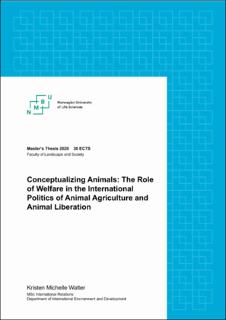| dc.contributor.advisor | Beaumont, Paul | |
| dc.contributor.advisor | Stuvøy, Kirsti | |
| dc.contributor.author | Walter, Kristen Michelle | |
| dc.date.accessioned | 2020-12-22T11:58:23Z | |
| dc.date.available | 2020-12-22T11:58:23Z | |
| dc.date.issued | 2020 | |
| dc.identifier.uri | https://hdl.handle.net/11250/2720774 | |
| dc.description.abstract | Agriculture has been greatly important in the process of food production, and while agriculture is referenced to in IR, it tends to be referenced to as part of sustainability, accessibility and human rights discourse. Indeed, focus in international relations has predominantly been on the human experience which in turn leaves out a social, economic and political element of the situation of nonhuman animals. This anthropocentric as part of the human/animal dichotomy lens has left the experiences of millions nearly unheard. It is this that makes the concept of “welfare” interesting to analyze within legislation because though contestation over food norms and animal norms exist, legislation has adapted to the challenges with a set of rules that ensure “good treatment”. While this research focuses on Norway as an example of this, Norway represents just one of many states where contestations around food norms are being made and welfare legislation is in place. These contestations come in various forms, from the assertion for better practices, more focus on sustainability, to calls for an outright end to the meat and dairy industry for animal liberation. The international stakes of norm contestation in regard of animals are high as the rules and practices in which a society operates are supported and informed by these norms. What happens in turn is that the marginalization of animals and oppression of a selection of species is continually accepted as part of the way of reality. It is this dynamic of power, language of support through legislation and the acceptation of practices that will be challenged via a Critical perspective informed by Critical Animal Studies. Critical Theory provides the lens in which to investigate the power dynamic that facilitates marginalization of nonhuman animals. While a CAS approach leads the thesis through a set of principles geared toward deconstruction of the dichotomies that inform the relationship between humans and nonhumans. Both theories focus on liberation and therefore this thesis too will operationalize the concept of animal liberation. | en_US |
| dc.language.iso | eng | en_US |
| dc.publisher | Norwegian University of Life Sciences, Ås | en_US |
| dc.rights | Attribution-NoDerivatives 4.0 Internasjonal | * |
| dc.rights | Attribution-NoDerivatives 4.0 Internasjonal | * |
| dc.rights.uri | http://creativecommons.org/licenses/by-nd/4.0/deed.no | * |
| dc.subject | Animal welfare | en_US |
| dc.subject | Animal rights movement | en_US |
| dc.subject | Animal studies | en_US |
| dc.title | Conceptualizing animals : the role of welfare in the international politics of animal agriculture and animal liberation | en_US |
| dc.type | Master thesis | en_US |
| dc.description.version | submittedVersion | en_US |
| dc.description.localcode | M-IR | en_US |

